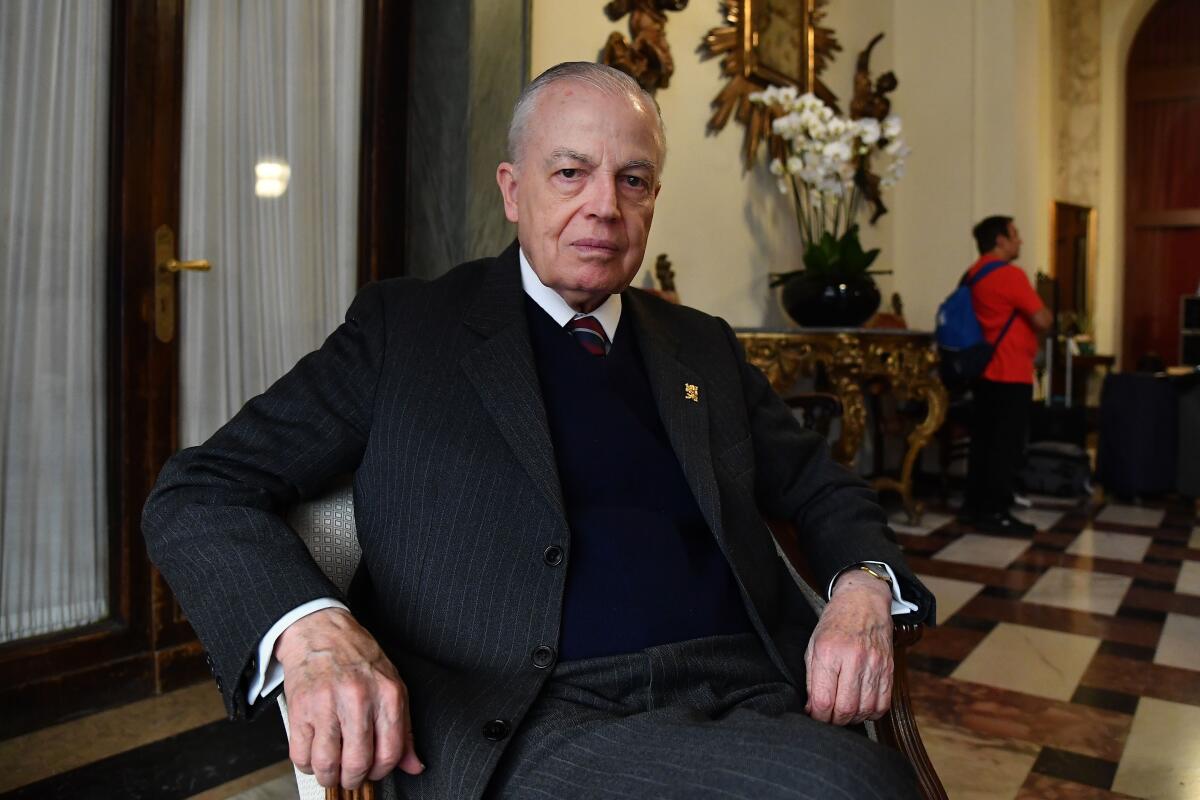Royalists pine for days of empire in Bolsonaro’s Brazil

Bertrand Maria José Pio Januário Miguel Gabriel Rafael Gonzaga de Orleans e Bragança e Wittelsbach has a regal name but no crown — which is what he craves.
“A return to monarchic rule is the only way to rule Brazil,” said the man more simply known as Dom Bertrand or, as he may prefer, “Prince Imperial of Brazil,” heir to Brazil’s defunct throne. “Because in the republic there is often schizophrenia.”
Dom Bertrand is the great-great grandson of Pedro II, Brazil’s last emperor, whose grandfather, King João VI of Portugal, fled to Brazil with the Portuguese court in 1807 to escape Napoleon.
Brazil’s monarchy was overthrown in 1889, following 400 years of rule. But the rise of conservatism ushered in by far-right President Jair Bolsonaro last year has emboldened those who feel republicanism has wrecked Latin America’s largest country. They call for the restoration of monarchical rule over Brazil’s 210 million people.
Dom Bertrand is seen by many Brazilians as their country’s king-in-waiting. His eldest brother — with whom he shares a rented house in São Paulo, crammed with portraits of family monarchs, royal memorabilia and Catholic relics — is 81 and reclusive.
The 78-year-old lawyer has been more active than ever in recent months, hosting royalist lunches and dinners. He opened a Twitter account that gathered 20,000 followers in two weeks. One of his first was Eduardo Bolsonaro, a congressman and second son of the president. (Some of his followers also follow Reza Pahlavi, heir to the late Mohammad Reza Shah of Iran.)
Dom Bertrand said: “The monarchist movement has grown enormously. There’s a monarchic circle in every Brazilian state,” without providing figures.
Facebook hosts several pages dedicated to the restoration of the monarchy — one, Pró Monarquia, has 97,000 followers; another, Monarquia Brasil, has 69,000 followers; Movement for the Restoration of Monarchy in Brazil has 54,000.
“It’s spontaneous,” Dom Bertrand said. “It is because the Brazilian people are conservative.”
At a lunch for monarchy fans held last year, in a private club in a leafy area of São Paulo and at which the Financial Times was a guest, Dom Bertrand’s younger brother, Dom Pedro de Alcântara de Orleans e Bragança, said: “I voted for Bolsonaro and will still vote for him; his values go alongside ours.”
He sat flanked by a priest, a judge and a congressman who sipped glasses of cheap Chilean merlot and referred to him as “your highness.” A paper imperial flag of Brazil — also green and yellow but with the coat of arms of the Empire of Brazil at the center instead of the motto “Order and Progress,” which is much despised by monarchists — was placed atop the table. A vast one made of fabric hung outside the building.
“Us monarchists have to support the current government,” said Dom Bertrand, adding that they are aligned with Bolsonaro’s pro-gun, antiabortion, climate change-skeptical stance — and that of his free-market economic tsar, Paulo Guedes.
“I know some ministers who are friendly to the monarchy but they cannot declare themselves royalists,” he said.
Dom Bertrand has published a book called “Environmentalist Psychosis,” which Bolsonaro has quoted in international forums to challenge concerns over deforestation in the Amazon. It calls climate change a “true conspiracy against our western and Christian civilization” and criticizes young Swedish climate activist Greta Thunberg.
Two impeachments, a string of corruption scandals and a brutal recession proved that republicanism had damaged Brazil, Dom Bertrand said. But it also gave rise to Bolsonaro and a reinvigorated royalist spirit being fanned through social media.
“Monarchists rise following moments of grave crises, trying to take advantage of Brazil’s institutional weaknesses,” said a Brazilian historian who declined to be named for fear of enraging the monarchists.
Dom Bertrand’s Stanford-educated nephew, Luiz Philippe de Orléans e Bragança, became a federal lawmaker on the coattails of Bolsonaro in last year’s election. “Some royalists still find me a Jacobin,” he joked, as his father relinquished his regal rights.
After Fernando Collor de Mello was impeached as president in 1992, Brazil held a constitutional referendum to decide the form of government, and 10.3% of those who voted, or almost 6.8 million, said they wanted a monarchical regime.
Support for the monarchy remained at more or less that level in 2017, when pollster Paraná Pesquisas reported that only 10.7% of respondents favored the return of the royal family, versus 84.5% against.
These days, one of the staunchest monarchists is Carla Zambelli, a congresswoman who is close to the president and his politically engaged sons. A recent post on her Twitter account ended with the declaration “Ave Imperio!” or “hail empire.”
“Ideally, in the long run, we should move to a parliamentary system and then establish that the head of state be a monarch,” she said. “The monarchist system is good for one reason: Because the monarch is not concerned about the next election. He will always care more about the next generation, which is something most politicians today don’t care about.”
Yet for Paula Vedoveli, a historian at the Fundação Getúlio Vargas, royal rule will remain a thing of the past in Brazil.
“It may be appealing to some, but there is no condition whatsoever for us to return to a monarchy,” she said.
© The Financial Times Ltd. 2020. All rights reserved. FT and Financial Times are trademarks of the Financial Times Ltd. Not to be redistributed, copied or modified in any way.
More to Read
Start your day right
Sign up for Essential California for news, features and recommendations from the L.A. Times and beyond in your inbox six days a week.
You may occasionally receive promotional content from the Los Angeles Times.






